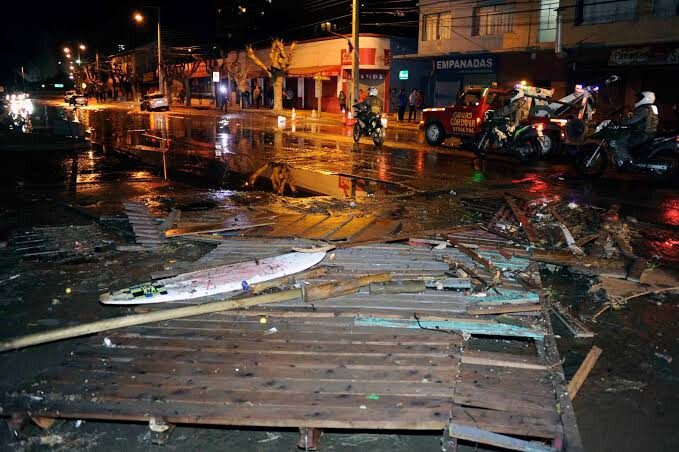
On Friday, a significant earthquake measuring 7.4 in magnitude struck the southern coast of Chile, prompting Chilean authorities to issue a tsunami alert for coastal regions. The United States Geological Survey (USGS) reported that the epicenter of the seismic event was located in the ocean approximately 219 kilometers south of Ushuaia, an Argentinian border city. The relatively shallow depth of the earthquake's origin raised concerns about the potential for tsunami generation.
In response to the earthquake, Chile's National Disaster Prevention and Response Office (ONEMI) swiftly issued an evacuation order for the entire coast of the Magallanes region and all beach areas within the Chilean Antarctic Territory. The Magallanes region, situated in the southernmost part of Chile, includes major cities such as Punta Arenas.
Chilean President Gabriel Boric took to his X (formerly Twitter) account to assure the public of the government's preparedness. "We are ready to deploy all necessary resources to respond to this potential emergency," President Boric stated. He urged residents along the entire coastline of the Magallanes region to evacuate, emphasizing, "Our duty now is to be prepared and follow the instructions of the authorities."
Local television footage depicted scenes of residents in Punta Arenas, located on the Strait of Magellan, moving towards shelters and taking to the streets following the alert. Roberto Ramírez, a local resident, informed a news channel, "We had to evacuate from work after the alarm, but people are calm and well-prepared."
Meanwhile, authorities in Ushuaia, the world's southernmost city in Argentina, suspended all water activities in the Beagle Channel for a minimum of three hours as a precautionary measure. The local government reported that the earthquake was felt mainly in the city of Ushuaia with a moderate intensity but was also detected in several towns across the province. They emphasized the importance of remaining calm when faced with such events.
As of the latest reports, neither Argentina nor Chile has reported any significant damage or casualties resulting from the earthquake. However, Chilean authorities are maintaining a heightened state of alert for potential tsunami activity and have urged coastal residents to move to safer locations and remain attentive to official broadcasts and instructions.
This seismic event occurred in a region situated along the Pacific Ring of Fire, a zone characterized by intense tectonic activity, including frequent earthquakes and volcanic eruptions. Chile, in particular, lies along the boundary where the Nazca Plate subducts beneath the South American Plate, making it highly susceptible to powerful earthquakes. In 1960, the country experienced the most powerful earthquake ever recorded, a magnitude 9.5 event in Valdivia, which caused widespread devastation and a significant tsunami.
The magnitude of the recent earthquake, 7.4, is classified as major and has the potential to cause substantial damage, including building collapse, especially in areas closer to the epicenter. When such earthquakes occur beneath the ocean floor, they can displace large volumes of water, generating tsunamis. The rapid issuance of a tsunami alert and the evacuation of coastal communities by Chilean authorities reflect lessons learned from past experiences and a proactive approach to ensuring public safety.
Tsunamis, also known as seismic sea waves, are characterized by long wavelengths and high speeds. Unlike typical wind-driven waves, they can travel across entire ocean basins and surge to immense heights upon reaching coastal areas, causing catastrophic flooding and destruction. The devastating tsunami that followed the 2011 Tohoku-Oki earthquake in Japan serves as a stark reminder of their destructive potential.
While initial reports indicate no immediate major damage from the Chilean earthquake, the जारी किए गए tsunami alert necessitates continued vigilance along the affected coastlines. The Chilean government has mobilized all available resources to prepare for any potential consequences and is prioritizing the safety and well-being of its citizens.
The international community is closely monitoring the situation in southern Chile, awaiting further updates on potential impacts. International cooperation may be necessary to support the affected regions in the event of significant damage and to aid in recovery efforts. The focus remains on ensuring the safety of the residents in the coastal areas and providing timely and accurate information as the situation unfolds.
[Copyright (c) Global Economic Times. All Rights Reserved.]






























